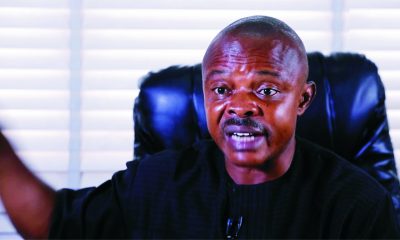Featured
Bestiality Of Power: The Moorish Tragedy (3)

The Moors, also called Moricos, were a race of Arab origin who lived in North-West Africa, with some of them invading and settling in Spain between the 8th century AD and 1492, the peak of their tragedy. Those of them who remained in Spain were subjected to stiff persecution and conditions such as being forced to be Christians, forbidden to speak or write Arabic, own any book written in Arabic and non-observance of their traditional ceremonies or festivals. Like the Jews, the Moors suffered severe tragedies and persecutions, but strangely they always grew prosperous through hard work, wherever they settled.
The issue of the travails and tragedies of the Moors over many centuries was raised at an International Conference, with a suggestion that the “Arab spring” and global terrorism associated with Islamic militancy have something to do with centuries-old root-causes. No doubt, the Moslem World has sad stories to tell about global oppression and persecution especially during the Dark Ages. The Christian World had actually referred to the founder of Islam as a false prophet, with available historical records of horrors and tragedies arising from persecution. The Punic Wars, destruction of Carthage and the Crusades serve as examples of hostilities.
No matter the origin and places of settlement of the Moors, they were resilient, hardworking and a shrewd race, capable of turning abilities into assets. They were people who could suffer severe pains, tortures and agonies in silence. They were Moslems and the Spanish Inquisition was their source of torment but the rich ones among them paid bribes to officials of the Inquisition to escape from the tortures which heretics were subjected to, so that they would recant and accept the Christian faith.
Historical records tell us that in 1563, Guerrero, Archbishop of Granada “had visited Pope Pius IV whom he told that his flock in Granada called themselves Christians but were such in name only. “The King of Spain Philip was begged to “Children between the ages of three and fifteen being taken from their parents to be brought up in the Christian Faith.” The Moors prepared to fight for their freedom and on 23rd December 1568, there was a revolt which was crushed in a bestial manner.
The King of Spain sent his half-half-brother Don John to command the army which dealt most cruelly with the Moors. History records say “men were massacred by the thousands, and the women and children captured that they might be sold as slaves”. The battle of Galera was bestial, bloody and callous, with Don John ordering that “not a living soul in Galera should be spared”. We are told that “for this gallant exploit, the Pope hailed Don John as the Champion of Christendom!”
The suffering of the Moors who could not be massacred became too much for the conscience of Don John to bear, that arrangements were made to relocate them in different places, with families forcefully separated. Like the Jews, the Moors who were allowed to settle here and there soon began to prosper, to the envy of their tormentors. Obviously, the hatred of the Moors was based more on their prosperity and resilience than on differences in their religions.
Like the Waldenese in France, the Moors, despite flogging and tortures, held on to their convictions but merely pretended to accept Christianity. In the various new settlements, complaints brought against them were that they never went to war, pretended to be Christians but were devoted solely to their work. The persistent persecution and plight of the Moors were such that some of them became bandits and mercenaries. An example of such mercenary was Shakespeare’s Othello, the Moor of Venice. Similarly, the role of his personal assistant lago (his Ancient) depicts the degree of contempt the Moors were held in Europe.
There was a time when Spain was dominated by great Islamic scholars until about 1608 when Philip III put forward some schemes for ridding Spain of the troublesome Moors and create an all-Catholic Spain. Despite their travails, tortures and the anguish of splitting families, the Moors did not become heartbroken, even though many left Spain as destitutes. Expulsion of the Moors was a state policy which lasted for centuries, with attendant acts of bestiality. When Philip III introduced alcabala, a tax levied on sales and purchase like modern day Value-Added-Tax (VAT), the prime targets were the Jews and the Moors.
The Archbishop of Ribera was eager that the Moors should be expelled from Spain, since it was impossible to kill them all. Those who were clamouring for the extinction of the Moors did what they could in their own private ways to cook up complaints and bear false witnesses against the Moors, including charges of conversing in Arabic in their privacies.
Apart from the battle of Galera where the most atrocious bestiality and destructions were committed, other centres of butchery and massacre of the Moors included Granada and Valencia. In the district of Aragon, some of the Moors were allowed to continue with their industrious lives because of the level of prosperity which they created for the Spaniards. Even though six percent of the Moors were allowed to remain, those sent to Balary for deportation to various places were given most callous and bestial treatment. Many died.
Any Nigerian reading this true historical summary of the fate of the Moors in Spain would wonder what the motive of bringing up this matter could be, and may even doubt the veracity of the facts stated here. Some international conferences where studies in the bestiality of power feature as themes use such opportunities as a mirror for understanding current global events. Would any reader dismiss the axiom that history repeats itself from era to era, and that those who cannot learn the lessons of history are doomed to repeat historical calamities!
For example, global terrorism associated with Islamic militarism, including Boko Haran etc, may have more explanations than what is commonly known. Is it not believable that the “bread” we cast upon the sea can return to us after many forgotten seasons? Whether the proverbial bread returns in the form of cake or unpleasant plague, the truth is that majority of humans can be described as grossly myopic. The Organisation of Islamic Conference (OIC) has records that are quite scary.
Bright Amirize
Featured
RSG Commits To Workers’ Welfare …. Calls For Sustained Govt, Labour Partnership

The Administrator of Rivers State, Retired Vice Admiral Ibok-Ete Ekwe Ibas, has assured the commitment of Rivers State government to workers’s welfare and industrial harmony in Rivers State.
The Sole Administrator gave the assurance after meeting with leadership of organized labour unions at the Government House, Port Harcourt on Wednesday.
Ibas reaffirmed government’s policy of prompt payment of salaries and pensions to workers and retirees, stating that all local government employees are not receiving the approved minimum wage.
He disclosed that approval has been given for payment of newly employed staff at Rivers State University Teaching Hospital and the Judiciary, while medical workers in Local Government Areas will now receive correct wages.
Ibas explained that, Government is reviewing implementation challenges of the Contributory Pension Scheme ahead of the July 2025 deadline, adding that Intervention buses have been reintroduced to ease workers’ transportation ,with plans to expand the fleet.
He said specialized leadership training for top civil servants will commence within two weeks, while due consideration is being given to implementing the N32,000 consequential adjustment for pensioners and clearing outstanding gratuities.
Ibas commended Rivers State workers for their dedication to service and called for sustained partnership with labour unions to maintain industrial peace.
“This administration recognizes workers as critical partners in development. We remain committed to addressing your legitimate concerns within available resources,” he stated.
The State NLC Chairman, Comrade Alex Agwanwor, thanked the Administrator for the steps taken so far with regard to workers welfare while appreciating his disposition towards alleviating the transportation problem faced by workers.
He also expressed appreciation for the government’s openness to dialogue and pledged continued cooperation towards achieving mutual goals.
The Rivers State Government assured all workers of its unwavering commitment to their welfare and called for continued dedication to service delivery for the collective progress of our dear State.
Featured
Labour Unions In Rivers Call For Improved Standard Living For Workers

The Nigeria Labour Congress (NLC), Rivers Council, has called for policies that will improve the economic situation of the country in order to ensure enhanced living standard for workers.
The State Chairman, Mr Alex Agwanwor, made the remark on behalf of the unions affiliated to Labour Congress during the 2025 workers day celebration in Port Harcourt, yesterday.
Agwanwor highlighted the demands of the Unions which included the immediate payment of pension arrears, implementation of the N32,000 minimum wage for pensioners, and payment of gratuities and death benefits without further delay.
“We are calling for the regulation and protection of e-hailing drivers, implementation of increments and promotions, and resolution of long-standing issues in the polytechnic sector,” he said.
Agwanwor on behalf of the unions appealed to President Bola Tinubu to reinstate the democratically elected Governor, Deputy Governor, and members of the Rivers State House of Assembly.
He stressed the importance of democratic governance and good working relationship with elected representatives.
According to him, the unions expressed disappointment over the imposition of taxes, increase in electricity tariff, and high cost of goods and services, which have further worsened the plight of workers.
“We urge the federal government to take measures to alleviate the suffering of citizens,” he said.
Featured
Tinubu committed to unlocking Nigeria’s potential – Shettima

Vice-President Kashim Shettima says President Bola Tinubu is committed to unlocking Nigeria’s full potential and position the country as a leading force on the African continent.
Shettima stated this when he hosted a delegation from the Hertie School of Governance, Berlin, led by its Senior Fellow, Dr Rolf Alter, at the Presidential Villa in Abuja last Wednesday.
He said Nigeria was actively seeking expertise from the global best institutions to enhance policy formulation and implementation, particularly in human capital development.
The Vice-President noted that President Tinubu was determined to elevate Nigeria to its rightful position as a leading force in Africa.
“The current crop of leadership in Nigeria under President Bola Ahmed Tinubu is ready and willing to unleash the full potential of the Nigerian nation on the African continent.
” We are laying the groundwork through strategic reforms, and at the heart of it, is human capital development.”
He described the Hertie School as a valuable partner in the journey.
According to him, Hertie School of Governance, Berlin, has track record and institutional knowledge to add value to our policy formulation and delivery, especially in this disruptive age.
Shettima reiterated the government’s priority on upskilling Nigerians, saying ” skills are very important, and with our Human Capital Development (HCD) 2.0 programme.
“We are in a position to unleash the full potential of the Nigerian people by enhancing their capital skills.”
The Vice-President acknowledged the vital support of international development partners in that effort.
” I want to thank the World Bank, the European Union, the Bill and Melinda Gates Foundation, and all our partners in that drive to add value to the Nigerian nation,” he maintained.
The Vice-President said human capital development was both an economic imperative and a social necessity.
Shettima assured the delegation of the government’s readiness to deepen cooperation.
” We need the skills and the capacity from your school. The world is now knowledge-driven.
“I wish to implore you to have a very warm and robust partnership with the government and people of Nigeria.”
Shettima further explained recent economic decisions of the government, including fuel subsidy removal and foreign exchange reforms.
“The removal of fuel subsidy, the unification of the exchange rate regime and the revolution in the energy sector are all painful processes, but at the end of the day, the Nigerian people will laugh last.
“President Tinubu is a very modern leader who is willing to take far-reaching, courageous decisions to reposition the Nigerian economy,” he added.
Earlier, Alter, congratulated the Tinubu administration for the successful launch and implementation of the Human Capital Development (HCD) strategy.
The group leader described the development as ambitious and targeted towards the improvement of the lives of the citizens.
He expressed satisfaction with the outcome of his engagements since arriving in the country.
He applauded the zeal, commitment, energy and goodwill observed among stakeholders in the implementation of Nigeria’s HCD programme.
Alter said the Hertie School of Governance would work closely with authorities in Nigeria across different levels to deliver programmes specifically designed to address the unique needs of the country.
He, however, stressed the need for government officials at different levels to be agile and amenable to the dynamics of the evolving world, particularly as Nigeria attempted to successfully accelerate its human capital development aspirations.












